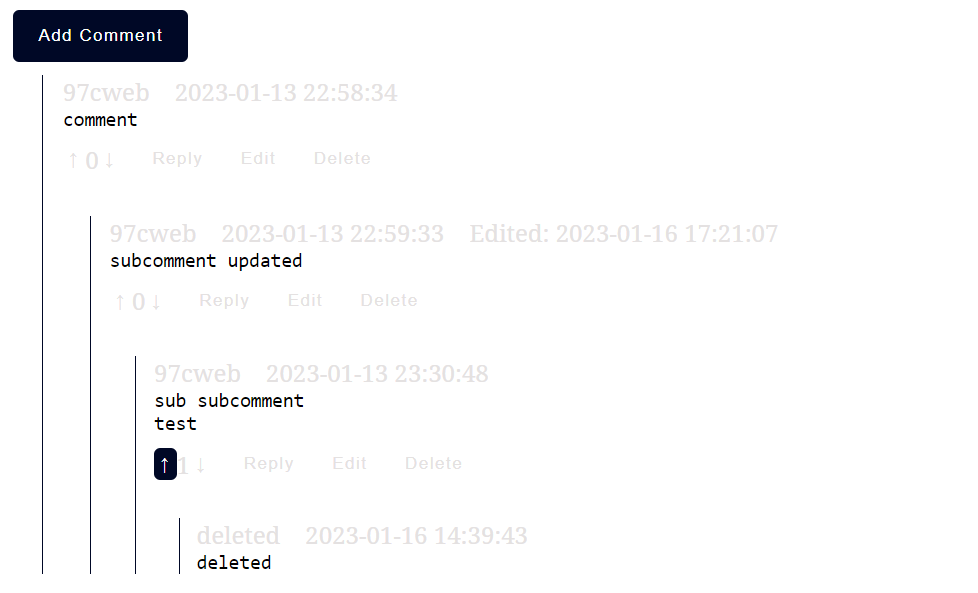Building Threaded Comments with SQLite and Flask: A Recursive Approach
Threaded (or nested) comment systems, like those used on Reddit or Hacker News, allow users to reply to replies, creating a tree of conversation. In this post, we’ll explore how to build a fully functional, recursive comment system using:
- SQLite as the database (lightweight, no extra setup)
- Flask as the backend web framework
- Jinja templates for rendering the thread structure recursively
This setup powers the comments across [YottaRock.ca] and supports nested replies of any depth.
Database Structure
We use a single comments table. Each comment knows:
- Which post it belongs to
- Which user wrote it
- Which comment (if any) it's replying to
- Its depth in the tree
CREATE TABLE comments (
id INTEGER PRIMARY KEY,
post_id INTEGER NOT NULL,
user_id INTEGER NOT NULL,
comment TEXT NOT NULL,
parent_id INTEGER,
depth INTEGER DEFAULT 0,
date_created TEXT DEFAULT CURRENT_TIMESTAMP,
FOREIGN KEY(user_id) REFERENCES users(id),
FOREIGN KEY(parent_id) REFERENCES comments(id)
);
This structure lets each comment link to a parent, forming a tree.
Recursive Logic (Python)
To render this tree, we recursively fetch child comments using a simple depth-first traversal. Here’s the core get_comments() function in Flask:
def get_comments(post_id, parent_id=None):
db = get_db()
if parent_id is None:
parent_condition = 'c.parent_id IS NULL'
else:
parent_condition = 'c.parent_id = ?'
query = f'''
SELECT c.id, c.comment, c.date_created, c.user_id, u.username, c.parent_id, c.depth
FROM comments c
JOIN users u ON c.user_id = u.id
WHERE c.post_id = ? AND {parent_condition}
ORDER BY c.date_created ASC
'''
args = (post_id,) if parent_id is None else (post_id, parent_id)
comments = db.execute(query, args).fetchall()
comment_list = []
for comment in comments:
comment_dict = dict(comment)
comment_dict['children'] = get_comments(post_id, comment['id'])
comment_list.append(comment_dict)
return comment_list
Rendering in Jinja (Recursively)
Using Jinja’s {% include %} inside the comment template, we render the tree with indentation based on depth:
<!-- comment.html -->
<div class="comment" style="margin-left: {{ 20 * comment['depth'] }}px;">
<p><strong>{{ comment['username'] }}</strong> said:</p>
<p>{{ comment['comment'] }}</p>
{% if g.user %}
<form method="POST" action="{{ url_for('blog.view', id=post['id']) }}">
<input type="hidden" name="parent_id" value="{{ comment['id'] }}">
<textarea name="comment" required placeholder="Reply..."></textarea>
<button type="submit">Reply</button>
</form>
{% endif %}
{% for child_comment in comment['children'] %}
{% include 'comment.html' with context %}
{% endfor %}
</div>
Each comment includes its children recursively — no front-end JS required!
Submitting a New Comment
When a user submits a comment, we:
- Check if it's a reply (parent_id)
- Lookup the parent's depth
- Save the new comment with depth + 1
if request.method == 'POST':
comment_text = request.form['comment']
parent_id = request.form.get('parent_id', None)
depth = 0
if parent_id:
parent = db.execute('SELECT depth FROM comments WHERE id = ?', (parent_id,)).fetchone()
if parent:
depth = parent['depth'] + 1
db.execute(
'INSERT INTO comments (post_id, user_id, comment, parent_id, depth) VALUES (?, ?, ?, ?, ?)',
(id, g.user['id'], comment_text, parent_id, depth)
)
db.commit()
Features This Supports
- Infinite nesting (well, limited by screen space)
- Replies to replies
- Simple layout control via CSS
- Efficient recursive loading

Comments
Log in to add a comment.